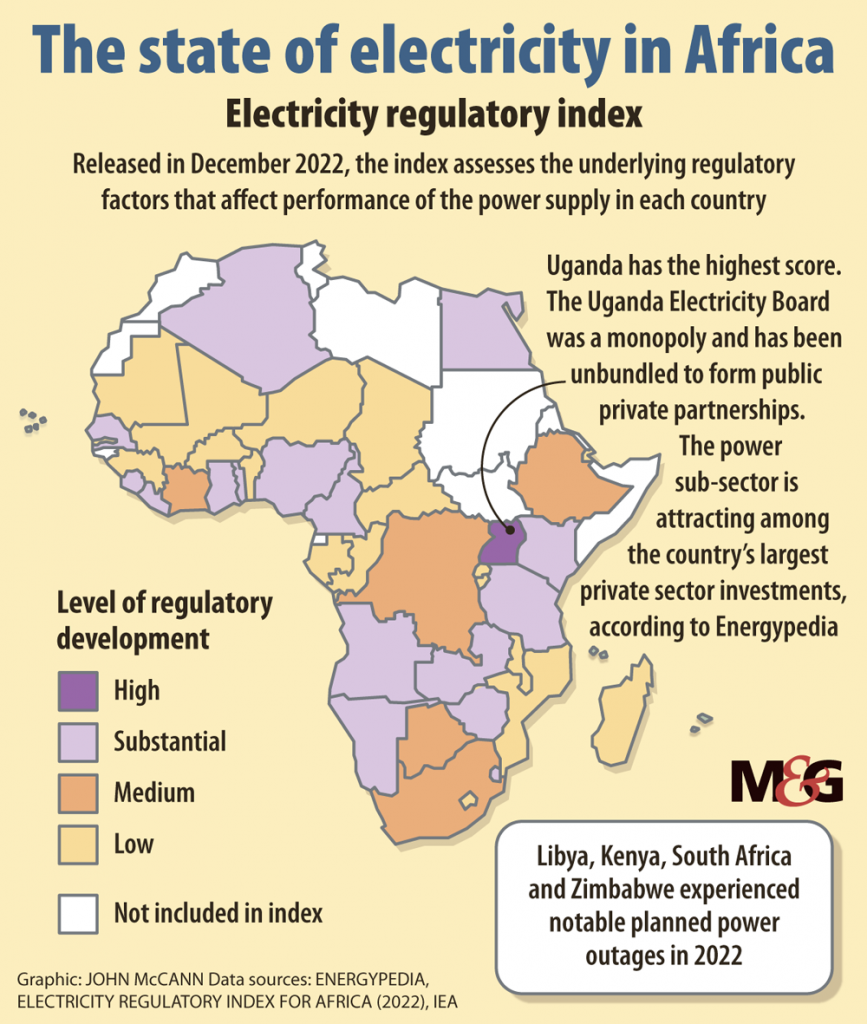Light up: Renewables are Africa’s best bet to solve the energy crisis. Photo: Robert Simmo/Nasa Earth Observatory
Africa’s energy crisis is a Cape-to-Cairo devastation, with countries caught in the crosshairs of electricity shortages that have slowed economic growth and now threaten political careers.
The African Development Bank says more than 640 million of the continent’s 1.4 billion people don’t have electricity, despite long incubating programmes from Zimbabwe to Egypt to electrify rural areas that have, for years, been neglected in energy planning.
Researchers warn that as the energy crisis gallops, “fewer than 40% of African countries will reach universal access to electricity by 2050”.
Last year, Jean-Paul Adam, a director at the United Nations Economic Commission for Africa (UNECA) told reporters that, by 2050, Africa should have increased power production five-fold.
The running theme in what has become a continental 21st-century nightmare is poor long-term planning and investment in a sector where infrastructure built by colonial powers are still being used, decades after independence.
In Egypt, a continental economic powerhouse, the authorities blame power outages on aged infrastructure and low investment in the sector.
Global financial uncertainty has made investors cautious about pouring foreign direct investment into Egypt’s renewable energy sector, while the government’s grip on the vital national security sector has also resulted in low investor interest, according to the Economist Intelligence Unit, the research and analysis division of the Economist Group.
As far back as 2014, President Abdel Fattah el-Sisi described the energy crisis as a “battle for our existence”.
Like many other African leaders, el-Sisi blames the crisis on the huge costs involved in financing the energy sector and poor investment.
It’s a familiar story for countries such as Zimbabwe where the constant breakdown of energy infrastructure dating back more than six decades is being blamed for 24-hour blackouts.
In Nigeria, energy authorities have reported that in March last year, the national power grid collapsed twice, plunging the country into darkness.
Researchers say the Nigerian power grid had, by 2019, collapsed 206 times since 2010, with the failures being blamed on a range of issues that included “insufficiently trained personnel, deficiency in local manufacturing, poor utility performance, theft of grid equipment, weather, gas supply, insufficient funding and the age of grid infrastructure”.
It’s a script echoed across the continent, but UNECA has noted that African countries have been slow to act on a crisis that has been long in the making, saying that there has been “over-reliance on coal, which runs contrary to global efforts to curb greenhouse gas emissions; [while] reliance on hydropower is highly susceptible to climate change”.
In 2020, the World Bank estimated that power outages were costing Nigeria about $28 billion, which translated to 2% of the country’s GDP.
Richer African countries bearing the brunt of rolling power outages have cited corruption as one of the reasons for the electricity crisis, while poor countries such as Malawi say low water levels at the country’s sole hydropower station are responsible for the energy deficit.
The NGO Renew’n’Able Malawi estimates that only about 12% of the population has access to the national grid, with rural electrification standing at 2%.
Malawi is an example of how climate uncertainty is having a crippling effect on power generation in a country where up to 98% of energy production is hydro-based. There is potential to generate 350MW but generation can fall as low as 200MW due to dwindling water levels.
 (John McCann/M&G)
(John McCann/M&G)
President Lazarus Chakwera, like many of his African counterparts, has seen his political fortunes threatened as civil society and locals put pressure on his administration to deal with the energy crisis.
Malawi has committed to promoting renewables but, like many African countries, investment has been limited, according to the Energy Supply Corporation of Malawi.
As part of broader efforts to light up the continent, the African Development Bank (AfDB) says its goal is to finance energy programmes that aim to achieve universal access to electricity by 2025.
“One of the most effective ways to address these challenges is to rethink how to effectively and productively use water in the Zambezi River and other water resources for energy generation,” said Tapiwa Gomo, an independent researcher, recalling a time when electricity production at the giant Kariba Hydropower Station fed several Southern African countries.
“It is also time to invest in solar-powered water,” he added.
The AfDB’s plan is “to provide 160GW of new capacity, 130 million new on-grid connections, 75 million new off-grid connections and providing 150 million households with access to clean-cooking solutions.
“To achieve these goals it is estimated that the investment needed will range between $60 billion and $90 billion per year.”
African countries went to COP27 with the hope of clinching concessions to fund the continent’s energy sector; however, the loss and damage clauses by rich countries again left governments returning home to ponder how to deal with electricity shortages.
Although renewable energy has been touted as Africa’s best bet, the continent’s energy transition has faced many hurdles, including the capital intensive nature of projects such as solar plants and natural gas, according to the International Energy Agency.
For Zimbabwean economist Eddie Cross, the answer to Africa’s energy crisis is straightforward: support from the global financial industry and the private sector.
“In addition, we have to learn from past mistakes and make sure that corruption and poor decision making do not derail these efforts.”